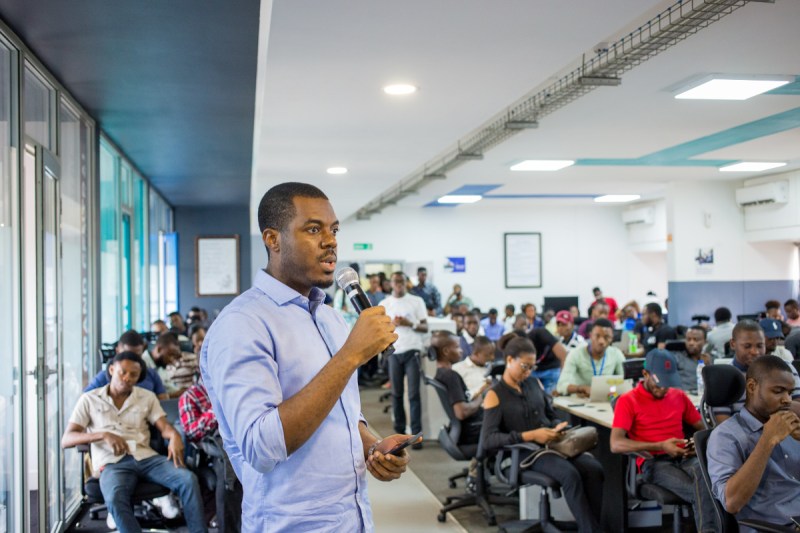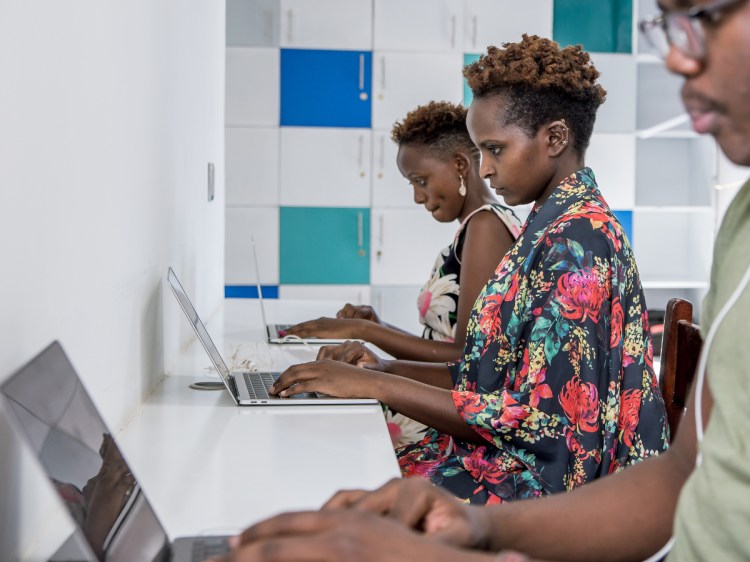Watch all the Transform 2020 sessions on-demand here.
Andela, a company that connects developers in Africa with growing U.S. startups like GitHub and Headspace, will incorporate artificial intelligence into its recommendation engine to create better matches between talent and employers.
“We’re working on the algorithms now and I expect it to be an active part of how we operate by the end of this year,” Andela CEO Jeremy Johnson told VentureBeat in a phone interview.
Last month, the company raised $100 million in a round led by Al Gore’s Generation Investment Management, one of the largest venture-funded rounds ever for a startup operating in Africa.
Bringing machine intelligence to its recommendation engine and making new tools to help managers evaluate the performance of remote engineering teams and employees will be a main focus of the funding, Johnson said.
June 5th: The AI Audit in NYC
Join us next week in NYC to engage with top executive leaders, delving into strategies for auditing AI models to ensure fairness, optimal performance, and ethical compliance across diverse organizations. Secure your attendance for this exclusive invite-only event.
The recommendation engine will be trained on data Andela has collected from developers since it was founded in 2015.
“We have 60 different assessments that are part of the application process, and so there’s a ton of data — psychographic, as well as behavioral — on who people are, what they’re able to do, what they like doing, and different personality types,” Johnson said. “[These are] going to drive not just where people are placed, but also who’s accepted into Andela.”
Using AI to recommend developers to businesses isn’t new. Last fall, HackerRank released the Tech Talent Matrix, a tool that uses machine learning trained by more than 7 million skill assessment tests to help companies evaluate developers.
Andela will take a different approach, factoring in assessments from roughly 130,000 applications, as well as data gathered during a six-month training course each developer will participate in.
To join Andela, a developer must first pass a rigorous competency assessment test. The company says less than 1 percent of applicants are accepted. Once selected, each Andela developer takes part in a six-month training program to strengthen technical and soft skills. Additional training material is provided to determine an individual’s learning velocity and how quickly they respond to feedback and are able to iterate.
Data from more than 1,000 developers who have completed this training and gone on to work for more than 200 companies will be used to train the engine, Johnson said.
“People think that you can do a whiteboard code review and actually figure out whether a person will be successful on a team, and it just unfortunately turns out not to work that way,” Johnson said.
Since all Andela developers work remotely, a special focus is put on skills that will allow the team to function smoothly. Soft skills training has become a growing part of the curriculum to ensure developers mesh well with remote teams, president Christina Sass told VentureBeat in an interview.
Andela’s initial challenges to growth
Andela is so selective with its applicants and rigorous with its training, Sass said, in order to help its developers overcome some initial obstacles.
In its first years of operation, Sass said, Andela’s biggest challenge was overcoming preconceptions businesses in the U.S had about the quality of developers from Africa.
Another challenge has been helping companies adjust to the idea of a remote dev team.
“With engineers, I think that people still have a strong preference for a full-time [local] employee, and we’re this hybrid model,” Sass said.
To address both concerns, Andela flies each of its developers to the United States for two weeks to meet with their manager and people they work with.

Above: Andela director of apprenticeship products Jolomi Otumara speaks at an Andela Learning Community meetup in Lagos, Nigeria
Like any modern service that connects developers and businesses, Andela works with both individuals who are graduates of computer science schools and those who are self-taught.
For less-experienced individuals interested in becoming Andela developers, or Andela developers who want to learn new skills, the company has offered courses and resources from companies like Google, Microsoft, and Udacity. Going forward, Andela may offer more courses that open its platform to developers with less traditional backgrounds or those starting from zero.
“Our long-term vision is to really inspire hundreds of thousands of technologists and give them a lot of resources. And then a small percentage of [those] we’ll hire as full-time employees. So we use [the program] to get to know the tech ecosystem and in some cases recruit full-time team members from those big courses,” Sass said.
Ambition, Africa, and AI
Companies in New York and San Francisco currently employ the largest number of Andela developers, while Salt Lake City, Los Angeles, and Washington D.C. also make up a significant portion of Andela’s clients.
Austin, Texas, a city whose tech industry has seen steady growth in venture capital funding, could rocket to number two or even become the top city for Andela developers by the end of the year, Sass said.
Andela was built by working with companies outside of Africa, but its founders say the Andela program could lead to a different kind of future, one fueled by what Sass calls “the biggest pool of untapped talent in the world.”
Up to 25 percent of Andela developers want to create their own business someday, Sass said, and in the years ahead, Africa’s population is due to grow much faster than the rest of the world’s.
With 60 percent of the African continent under the age of 25, United Nations projections estimate that Africa will be the youngest continent on Earth for generations to come and will account for more than half of global population growth by 2050.
Andela has drawn comparisons to Indian companies that in the 1990s outsourced computer science talent to the U.S.
Johnson argues Andela doesn’t fit this mold because its developers don’t have to move abroad.
“The difference here is that because distributed teams are becoming so common, and they’re such an important trend in the tech world, people don’t have to leave their home country,” Johnson said. “And so you can be working as a full-time team member with a top-tier startup in Silicon Valley from Lagos, and still be the head of the local Google Developer group or really active in the local tech scene in a way that wasn’t possible 10 years ago.”
Andela will incorporate AI into how it decides to hire and assign its developers, but AI expertise is also beginning to become part of what Andela clients want. Machine learning isn’t part of the tech stack offering from Andela today, but Johnson said he’s seen a growth in interest from companies who want to hire Andela developers for machine learning projects.
“They would love to have it be a machine learning person, but they’re saying ‘we can’t find that person.’ And so because of that, yeah, you know, we hear ‘Your developers that are currently working with us are great. Do you have Python developers that are interested in data science that would be open to coming in and learning?'”
There are a number of signs that artificial intelligence is growing in adoption among developers in Africa.
The ICML conference will be held in Addis Ababa, Ethiopia in 2020, the first major AI conference to be held in Africa. ICML follows Deep Learning Indaba, a conference held annually in South Africa whose attendance nearly doubled from 300 attendees in 2017 to 550 in 2018, organizers told VentureBeat. Smaller deep learning events called IndabaX were introduced in 2018, and have grown from being hosted in 13 African nations in its first year to 26 this year.
Organizations like AI Saturdays and Facebook’s Developer Circles have also grown in popularity, while a 2018 cohort of Fast.ai, a company whose goal is to democratize access to AI, found its second largest group of users came from Lagos, Nigeria.
Andela has offices in places like Kampala, Uganda with remote workers in Accra, Ghana and Cairo, Egypt. Its largest operations in Nairobi and Lagos provide space for more than 700 developers each. An office in Kigali, Rwanda opened in late 2018; it recently accepted its first cohort of developers and will operate as a pan-African hub for developers from across the African continent, Sass said.


